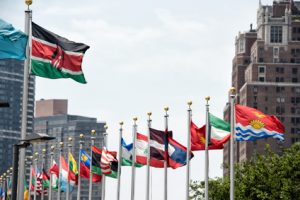I hope you’re enjoying this Christmas/Hannukah/”Festivus” (“for the rest of us”)/New Year’s break. I’ve spent some nice time with family and friends–have you? I love my family, and I love having friends… which makes this blog post pretty risky, because it might make me some enemies.
A few days ago, several members of the UN Security Council introduced a resolution condemning the ongoing building of Israeli settlements in the occupied West Bank and East Jerusalem. In the recent past, the US had vetoed all proposed resolutions critical of Israeli actions. This time, it abstained. The resolution passed.

This won’t be another diatribe about the Arab-Israeli conflict. Instead, I want to put this in the context of peace processes, and specifically how an international consensus can help overcome a power imbalance that prevents settlement of a conflict.
Often in a conflict, there is one party that more or less favors the status quo, and another party trying to change the status quo. What I’ve observed is that when the powerful, interested countries are unified in their stance that the status quo has to change, it eventually changes. The end of Apartheid in South Africa is a good example. Another is the Northern Ireland conflict, where once the powerful outside players–Britain, Ireland, and the US–agreed on what needed to change, it did. In tragic contrast, the lack of international consensus has hindered settlement of the Syrian civil war, as I wrote a while back. Less well known, the international community is split on the status of Moroccan-controlled Western Sahara, which is seeking independence. The deadlock there continues.
The deadlock on the Israeli-Palestinian conflict continues too, of course. There has been a global near-consensus for many years that the status quo should change–that is, the Israeli-occupied West Bank and Gaza should become an independent state. This “two-state solution” would mean Israel would give up land it captured in the 1967 war. Although official US policy has supported this consensus, the US has repeatedly vetoed Security Council measures to that effect. The world has therefore been split between the sole superpower and everyone else. For this moment, at least until Trump’s inauguration, the world speaks with one voice about the need for Israel to stop building settlements as a way to further its claim on the West Bank. We now have a glimmer of hope that the world will now be unified on the two-state solution, the only viable model that has been put forward for Israeli/Palestinian peace.
It is hard to get anyone in a position of power to give something up. In a domestic context, this might be accomplished through law enforcement. In the global context, there is no such thing. The closest we have is the consensus of the international community. For peace processes generally, the broader point is that while the detailed settlement of the conflict must be negotiated by the parties themselves, it is important to obtain a consensus of the key international players on the broad contours of a solution (a “formula” as it’s often called), especially if one party is to be persuaded to give up something. This implies the need for an international tier in a peace process in which the powerful, interested countries negotiate a broad formula for settlement before the warring parties themselves negotiate the specifics. Without this, the outside countries tend to support opposite sides in the conflict and drag out the fighting. We’ve seen this all too many times.
Now, if I’ve made you angry–or if you have any other reaction–please comment!
This is a long and sad conflict– which needs to change, the resolution of which could more broadly affect the Middle East in” a positive way. The resolution states that the status quo, and even the expansion of settlements is getting in the way. John Kerry’s speech yesterday set out what I think are the facts that are “beyond change.” Something must happen to move these parties to a peaceful two state solution– and yet I am fearful that the new administration will revert to the one state status quo. BiBi seems to be set continuing and aggressive– defensive stance with little hope of any long-term resolution. I am hoping some new thinking will emerge.
Well written, Suzanne. This conflict has been around for a long time, and the two-state solution seems by far the most reasonable solution. I think this step by the US is actually a very good one at the end of Obama’s term. We shall see how it evolves under the new Trump government. Maybe he will surprise us.